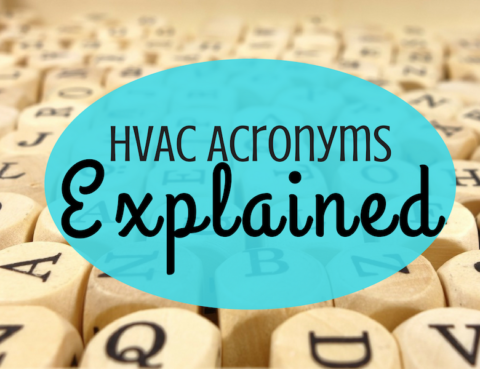Do you get annoyed by HVAC gobbledygook? Perhaps you’re blow away by the balderdash of terminology? Instead of getting overwhelmed with (seemingly) gibberish terminology, D&D is going to share a few important words to know. Read on to have some HVAC acronyms explained.
No, we aren’t going to make you sit through a vocabulary test – these are actual terms you may come across in your daily life!
HVAC Acronyms Explained
BTU – British Thermal Units
Traditionally speaking, this is a unit used to measure heat. It is defined as “the amount of heat required to raise the temperature of one pound of water by one degree Fahrenheit.” It is a very scientific term, but it is still widely used in the HVAC profession.
EER – Energy Efficiency Ratio
While it’s important to keep your home cooled, it’s also important to make sure that your appliances aren’t needlessly wasting energy. A unit’s EER can help you to determine how effective the appliance’s output is based on certain criteria. Ever heard of EnergyStar ratings? Those ratings are based on energy efficiency.
HERS Index – Home Energy Rating System
The HERS Index was created to establish a benchmark to determine how energy efficient a home is in relation to others. The higher the number, the less efficient the property is. The lower the number, the more energy efficient. For instance, it is assumed that a standard, newly constructed home is typically given a score of 100:
- Another new home is scored at 70: This means that this home is 30% more efficient than our subject.
- An older home is scored 130: This means that this home is 30% less efficient than our subject.
MERV – Minimum Efficiency Reporting Value
This is a really long title for what basically means the number on the side of an air conditioning or furnace filter. But what does the number mean? Basically, it is the effectiveness of how well your filter is at removing particulates from the air. The numbers range from 1-20: 1 is an average filter for a window air conditioner and 20 is the filtration system for medical or manufacturing cleanrooms. Most residential air conditioners use filters rated between 8 and 12.
Are you completely and utterly confused? That’s okay. That’s why it’s important to call the professionals of D&D Plumbing, Heating, and Air Conditioning to help you navigate HVAC terminology.



